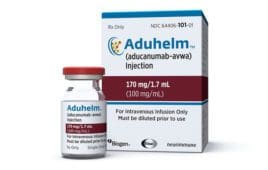
Image courtesy of iStock
The need for therapies that change the course of Parkinson’s disease is considerable.
“There are zero disease-modifying treatments for Parkinson’s,” said Dr. Allan Levey, professor and chairman of Emory University’s department of neurology.
Parkinson’s disease affects some 10 million people worldwide, according to the Parkinson’s Foundation.
Current drugs for Parkinson’s make it possible to “reverse symptoms pretty well for many people for many years,” Levey said. “But the reality is their symptoms are sort of masked. The disease is still getting worse on a daily basis.”
Most Parkinson’s treatments focus on managing dopamine levels in the brain. The basis of that strategy traces back to formative research in the 1960s involving levodopa. Today, levodopa-based therapies continue to be the standard of care for Parkinson’s as they tend to be relatively low cost and effective in treating the disease’s motor symptoms.
Yet, the introduction of disease-modifying therapy for Parkinson’s would transform the treatment paradigm and fuel strong demand, according to Sarah Elsayed, neurology analyst at GlobalData.
Drug developers are pursuing a range of strategies to treat Parkinson’s disease. Several disease-modifying candidates target alpha-synuclein (α-syn), a protein implicated in Parkinson’s disease pathology. One of the defining characteristics of Parkinson’s is the buildup of alpha-synuclein that results in Lewy-bodies — clumps of proteins that form within nerve cells in people with Parkinson’s.
Disease-modifying therapy (DMT) candidates for Parkinson’s that target alpha-synuclein include the following:
- Anle138b is a small-molecule drug from the German biotech MODAG. The company announced in December 2020 that it was launching a Phase 1b study for anle138b in patients with mild-to-moderate Parkinson’s.
- NPT088 from Proclara Biosciences is in clinical development for Alzheimer’s. The drug intends to prevent alpha-synuclein from clumping together. The Michael J. Fox Foundation provided a grant to Proclara for preclinical development work on the medicine.
- PD01A from AFFiRiS is a vaccine designed to boost antibodies targeting alpha-synuclein. The vaccine is in a Phase 1 trial.
- RO7046015/PRX-002 (Prasinezumab) from Prothena (NASDAQ:PRTA) and Roche (SWX:RO) intends to halt the spread of aggregated alpha-synuclein. The drug is in a Phase 2 study and will advance to a Phase 2b study known as PADOVA slated for the second half of 2021.
Other strategies to modify the course of the disease include countering the effects of mutations in the GBA and LRRK2 genes, which have been linked to the disease.
Another strategy is to exploit existing drugs to determine whether they can modify the course of Parkinson’s. Novo Nordisk’s Victoza (liraglutide) is an anti-diabetic drug with promise for treating Parkinson’s. A glucagon-like peptide-1 (GLP-1) receptor agonist, liraglutide, has shown neuroprotective benefits for Parkinson’s in early trials.
GlobalData projects that if PRX-002 and Victoza win regulatory approval for Parkinson’s, they could generate projected sales of $2.1 billion and $769 million by 2029, respectively.
The failure rate for Parkinson’s disease clinical trials remains high, Elsayed cautioned.
Sanofi recently canceled a Parkinson’s disease program in February for GZ-402671 (venglustat), a candidate intended to address lipid production associated with a GBA mutation. Biogen withdrew a program related to cinpanemab, a human-derived monoclonal antibody targeting alpha-synuclein.
“While the promise of DMTs and neuroprotective therapies has often been met with failure in late-stage trials, a breakthrough therapy in this risky area will be rewarded generously,” Elsayed said. “If any pipeline agent proved to offer even the slightest disease-modifying properties, it would be a treatment game changer within this stagnant area of development.”
Filed Under: Neurological Disease





Tell Us What You Think!
You must be logged in to post a comment.